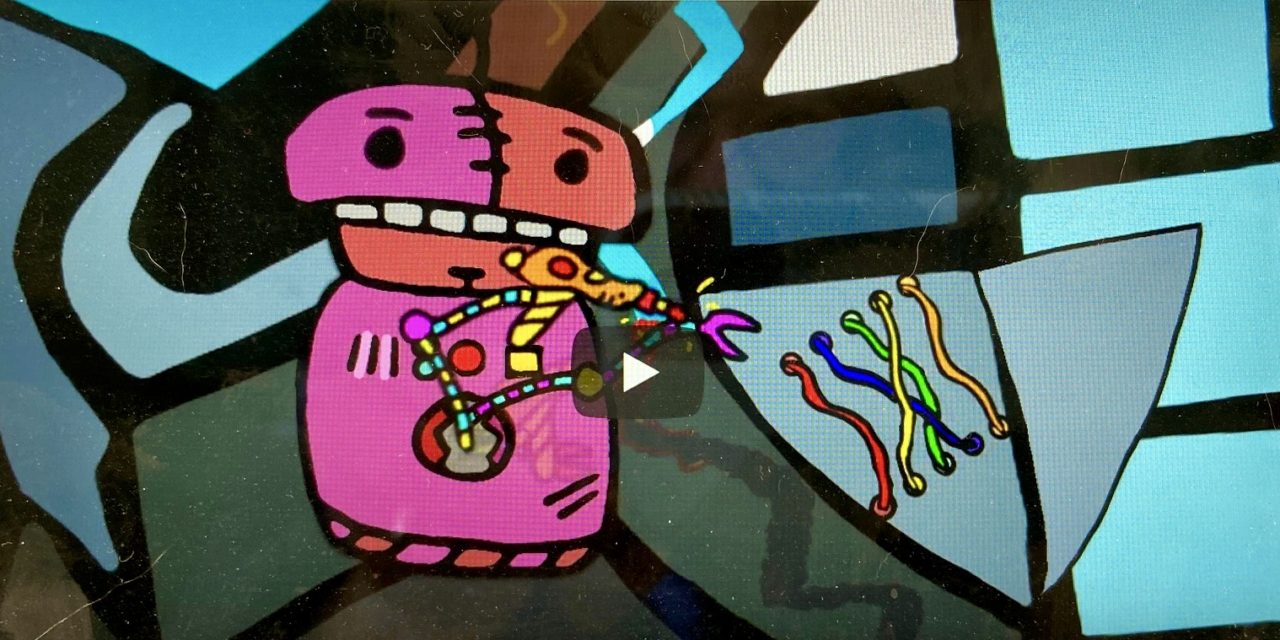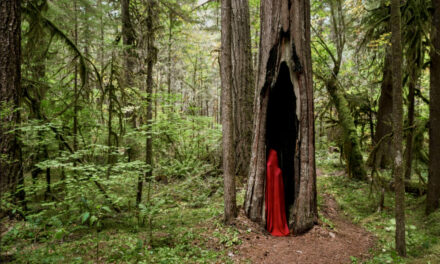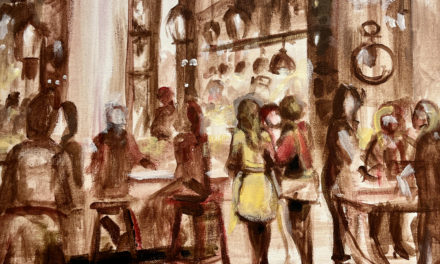(Above: A still shot from a video animation created by Pleasant Hill students Jessica Clough and sisters Aurora and Zoey Brott. The “Sinister Sisters,” as they call themselves, created a video that has advanced to the international finals of Destination Imagination’s annual problem-solving competition. It involved creating more than 2,000 drawings.)
Note: This story originated as a piece given to a new, nonprofit endeavor called Highway58Herald, an online news service begun by retired/former banner journalists in the Lane County area, notably Doug Bates and Dean Rea. It concentrates on news from communities along the Highway 58 corridor between Oakridge and Interstate 5 and can be read at http://highway58herald.org.
By Randi Bjornstad
Three girls from Pleasant Hill — two sisters and a friend who lives just across the road in their small rural Oregon community — have earned a spot in the finals of an international problem-solving competition for students in age groups ranging from pre-kindergarten through college.
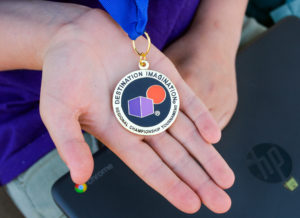
Aurora Brott holds the medal that the Pleasant Hill Team — they call themselves the Sinister Sisters — won in the regional D.I. competition; photo by Paul Carter
This team consists of Pleasant Hill ninth-graders Zoey Brott and Jessica Clough and Zoey’s younger sister Aurora Brott, who’s in sixth grade. All three have been active in Destination Imagination for five years.
The nonprofit educational program — known to many simply as DI — encourages students to hone their problem-solving “superpowers.” Each year DI designs a problem-solving challenge, and teams of up to seven students tackle it together, choosing a focus based on either science, technology, engineering, art, or math — known in modern educational parlance as STEAM.
At the same time, DI puts a high value on the importance of collaboration, encouraging the teams to meld their individual imaginations and ideas as they craft their solution. Then qualifying student teams begin to compete with each other, starting locally and working upward through state and regional levels on the way to the international competition. The United States has Destination Imagination programs in 48 of 50 states, and as many as 20 other countries also compete.
After 35 years of working with talented-and-gifted programs, including in Pleasant Hill, educator Joan Hladky retired, but she stayed on to continue working with its Destination Imagination students. As southern regional director of DI in Oregon, she works with teams from Salem south.
“I’m kind of a one-woman show,” Hladky said. “But I still enjoy being connected.”
Of course, her activity with Destination Imagination during the 2020-21 school year has been drastically different from usual because of the ravages of the coronavirus pandemic. Oregon usually fields between 70 and 100 teams of up to seven students each, but this year only 10 teams participated, she said.
The southern Oregon region “usually has between 20 and 40 teams per year — this year there were two,” Hladky said, one of them being the girls from Pleasant Hill.
“And I don’t know if that even would have happened if these two families didn’t live so close together,” she said. “They decided to become their own ‘pod’ and limit their interactions with other people so that the girls could do their DI project.”
The silver lining of the pandemic’s effect, however, is that the 2020-21 competition has been completely virtual, so that instead of creating and performing skits or doing other forms of live presentation that characterized past competitions, teams could create online presentations in a video game formatso.
“These girls were very happy when they heard that,” Hladky said. “They immediately said ‘anime,’ and they were off.”
Aurora Brott said she likes the video choice “a lot.”
“I don’t really like to have to memorize lines to do a performance,” she said. “I’m not so great at that. This way, we already have the video done, so I don’t have to worry about missing a line and messing up.”
On the other hand, the team has missed out on interactions with fellow students on other teams, Zoey Brott said.
“It’s fun to be with others and see what they are doing, too,” she said. “When you have to do skits, there are always outlandish costumes, and in that sense there’s a fun atmosphere of being around a bunch of creative people. This year we haven’t been able to experience that.”
At the same time, doing a video demanded learning a whole new set of skills that they might not otherwise have tackled, the girls agreed.
“We had to draw more than 2,000 pictures to create the animation,” Jessica Clough said. “We planned out the parts of the video to meet the requirements — there had to be a problem to solve, three things you had to collect to make a tool foto solve the problem, and there had to be a hero with a special ability.”
Character development was an early challenge for the Pleasant Hill team because the girls included a raccoon and a caterpillar in their cast of characters, “and we didn’t know what they would sound like or what special abilities they might have,” Clough recalled. “But once we figured everything out, we broke the animation into beginning, middle, and end, and each one of us did one part.”

The team from Pleasant Hill — dubbing themselves the Sinister Sisters — won a variety of awards for their entry in the annual DI competition.
Their video game includes a spaceship crash, a fight scene, and the required three separate quests carried out to gather what the hero needed to solve the problem.
That in itself was a challenge, Zoey Brott said, “because we had to make sure we had cohesion from one person’s work to another. So we imported images from each other and then changed them as little as we could to keep the continuity as the video went along.”
Hladky, who has worked with the girls in DI for the past four years, said they have learned the value of that approach well.
“Working with them this year has been the highlight of each week of the pandemic for me,” she said. “We started in November, they set the main goal of doing it all themselves, and our weekly Zoom meetings were times for them to share where they were on the goals they had set.”
Their division of labor in creating the animation is a perfect example of their skill and commitment to the overall result, Hladky said.
“They each did one-third of the (work), yet when you see the result, you can’t tell where each person’s begins and ends. This illustrates the smooth teamwork they have exhibited all the way through.”
Their attention to detail and cooperation paid off as the girls won “a good-sized first-place trophy from the Affiliate (state) Tournament on April 3, as well as a special DaVinci Creativity Award for the quality of their animation.
Then came the decision whether to participate in the Global Finals, originally slated in pre-pandemic times to take place in Kansas City, Mo. That level of competition involves a hefty entree fee.
The exposure to students from other states and countries — “One year we were sitting right next to the Polish delegation, and that was really exciting,” Hladky said — makes it a worthwhile experience in itself, but the girls and their families decided they would participate only if the competition was all virtual.
In the end, Destination Imagination decided in early April to keep the Global Finals completely online. Soon after, the Pleasant Hill girls and their families made the commitment to participate, clearing the way for them to submit their Team Challenge Solution.
In June, they will be given an additional Fast Flex Challenge that teams in the international competition must solve and submit for judging within a two-week timeline, and the quick turnaround performance will help determine their final score in the global competition.
The outcome of the 2020-21 Destination Imagination Global Finals will be announced in July.
For information about the Destination Imagination program and competition requirements, go online to destinationimagination.org
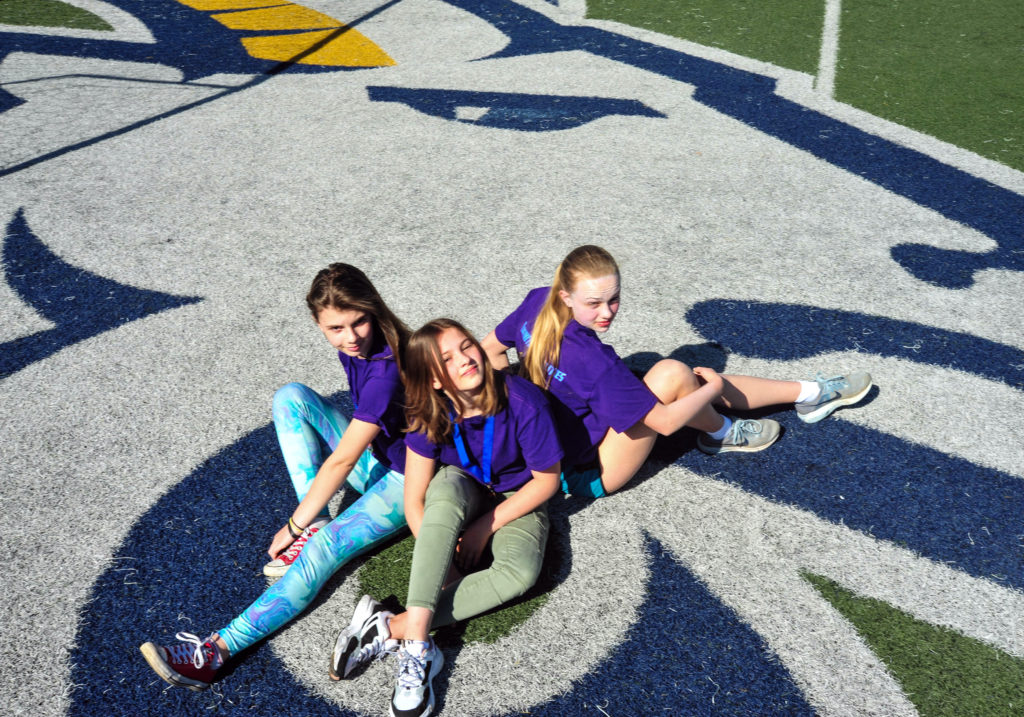
A team of three students from Pleasant Hill will compete in Destination Imagination’s global problem-solving competition this summer. From left to right, they are Jessica Clough, Aurora Brott, and Zoey Brott; photo by Paul Carter

